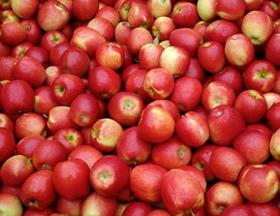
The European Commission's decision to lowerthe maximum residue level (MRL) of diphenylamine (DPA) - a postharvest treatment to control scald on top fruit - to 0.1ppm on all apples and pears sold into the EU, couldprove to be 'disastrous', sources claim.
It was announced last week that the sanction to bring down the current MRLof 0.5ppm to 0.1ppm will be effective from January 2014.However, Adrian Barlow, chief executive of English Apples & Pears, has warned that a reduction in top-fruit exports, from countries that refuse to search for an alternative to DPA, could cause significant supply issues next summer.
'My concern is that there will be a shortage of apples on market in the summer of 2014-15, which will have an adverse impact on consumption,' said Barlow. 'Everyone is under the opinion that the UK public should be eating more fresh produce so it would be a disaster if there were insufficient apples in the market to fully meet consumer demand.'
'Ridiculous' stance
Barlow's fears have been confirmed by Charles Hughes of South African fresh produce marketing firm Tru-Cape. Hughes admitted that the country, which is a significant exporter of top fruit into Europe, and its producers will now have to 'strongly reconsider' the security of exporting into the European market.
'The EU’s anti-chemical stance is now bordering on ridiculous,' said Hughes.'As a result, my concern is that in Europe and Germany they are going to wake up soon and see that there is no fruit and vegetables on the shelves.'
Barlowname-checked New Zealand as a positive example of a country operating without the use of DPAand added that post-harvest treatment alternatives such as SmartFreshcan be utilised by growers.The UK currently imports over 32,000 tonnes of non-EU apples between July and April ever year, and Barlow said the DPA ruling represented a big opportunity for UK growers to increase home-grown production.
He added: 'There will be big opportunities for the English industry to produce late varieties that can be marketed during our summer, and this change will represent a big opportunity.
'However, my concern is that it will take a lot of time for us to build up production to take full advantage and a big investment in orchards and facilities, therefore we would hope that countries such as South Africa would look to find alternative measures rather than ceasing business into this country.'
Hughes said that there wasn't a good enough alternative to DPA on the market and that the EC risks certifying the production of harmful top-fruit.
He explained: 'Even though there are alternatives, they have to be checked to a point that they are safe for human consumption. You could potentially be getting rid of something safe (DPA) and replacing it with something unsafe.'
Sarcastically adding that South African producers had 'only been using DPA for about 100 years', Hughes insisted that the country will try its best to avoid finding an alternative market to the EU, but says there will be 'inevitable issues' with upcoming exports into Europe and the UK as a result of the ruling.
Furthermore, Barlow confirmed that the level of pesticide residues on untreated apples that have come into contact with bins and facilities where DPA residues are still prominent is stabilising to levels of around 0.1 to 0.2ppm. Barlow says that residue testing will continue among UK growers to make sure levels continue to fall.
Chile
The new DPA regulations could cause shortages of green apple exports into the EU market according toAntonio Walker, director of Fedefruta, the Chilean fruit growers’ federation.
Walker says that the country's growers currently use DPA on green apples to control scald and that of last season's 1.5 million boxes exported into Europe, many were produced using the postharvest treatment.
He explained: 'DPA is product that we have used for a long time which has allowed us to reduce scald on apples, particularly Granny Smith. There are some 5,000-6,000ha under Granny Smith production in Chile, so the DPA ban will definitely affect Granny Smith as its main export market is Europe.'
Although Walker believes postharvest treatment SmartFresh can be effective in replacing DPA, he says it will take time to fully convert production practices.
However, another leading Chilean applie supplier told FPJ that the ban will have little impact as the majority of the country's apple producers are already using SmartFresh.
He said: 'We are not using DPA on apples any longer and instead we use Smartfresh, so the ban will not change anything for us. We have not used DPA for 3 seasons now.'



